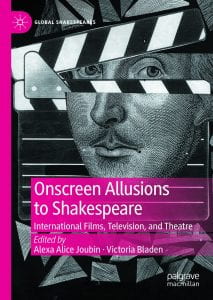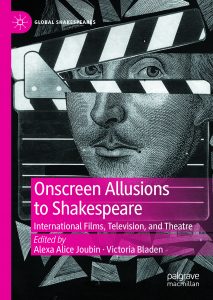 Shakespeare’s plays and motifs have been cited and appropriated on screen since motion pictures were invented in 1893. Allusions to Shakespeare haunt our contemporary culture in a myriad of ways, whether through brief references or sustained intertextual engagements.
Shakespeare’s plays and motifs have been cited and appropriated on screen since motion pictures were invented in 1893. Allusions to Shakespeare haunt our contemporary culture in a myriad of ways, whether through brief references or sustained intertextual engagements.
For example, in Tom Hooper’s biopic The King’s Speech (2010), Hamlet’s “to be or not to be” speech is recited in key scenes, suggesting that reciting Shakespeare might just cure stuttering. Lionel Logue (Geoffrey Rush), a speech therapist for King George VI, also uses Caliban’s speech in an educational game with his children. In a film about a stuttering monarch learning to master the radio to speak to his subjects, the “voices in the air” that Caliban longs to hear become ironic. Both the king, who is struggling with speech disorders and is robbed of a voice, and his therapist, a subject from the Commonwealth who is more eloquent but id dismissed by the royal family.
Shakespeare may not be the main focus of tattered, allusions in cinema, television, and theatre, but the canon remains a key factor in the cultural meanings of cinema. Even passing references to Shakespeare can have the power to shift the meanings and readings of a work.
For instance, “Shakespeare” is deployed as a reminder of human civilization in Miguel Sapochnik’s post-apocalyptic Finch (2021). In a philosophical scene that probes the question of what it means to be human, Finch Weinberg (Tom Hanks), the sole survivor, takes a humanoid robot he built into a derelict theatre to salvage food. It may seem coincidental in the plot, but clearly dramaturgically intentional, when that theatre turns out to be the venue for “Springfield Shakespeare Festival.”
The camera lingers frequently on the marquee with the word “Shakespeare” above the entrance. Inside the theatre, the android passes in front of a poster of a production of Much Ado About Nothing and spontaneously offers an analysis of that play in his monotonic, synthetic voice. His analysis, casual as it may seem, echoes the theme of post-apocalyptic mistrust: “This is a play by William Shakespeare, a dramatic comedy about love, deception, and other human misunders…”
In Onscreen Allusions to Shakespeare, edited by Alexa Alice Joubin and Victoria Bladen, we ask: What is the effect of such allusions, whether fleeting references or rewritings inspired by a quote? Furthermore, what are the reception dynamics at play here among “knowing audiences” and amateurs? The meanings of tattered allusions emerge from the oscillation between hypotexts (earlier texts that inspire subsequent works) and hypertexts (texts with embedded allusions that one may or may not pursue).
_________________________
Excerpted from the Introduction to Onscreen Allusions to Shakespeare: International Film, Television, and Theatre, ed. Alexa Alice Joubin and Victoria Bladen (New York: Palgrave, 2022), pp. 1-12.
To read a sample chapter, click here.
This collection of essays extends beyond a US-UK axis to bring together an international group of scholars to explore Shakespearean appropriations in unexpected contexts in lesser-known films and television shows in India, Brazil, Russia, France, Australia, South Africa, East-Central Europe and Italy, with reference to some filmed stage works.

